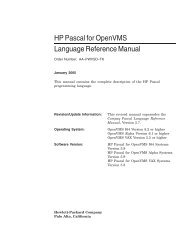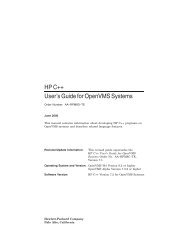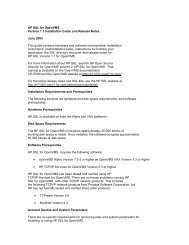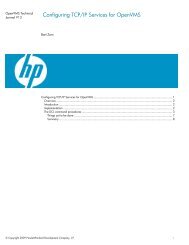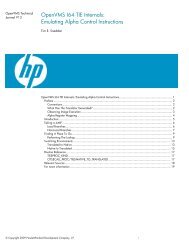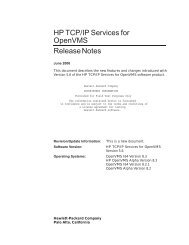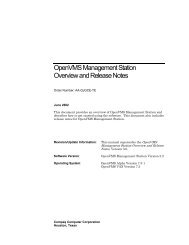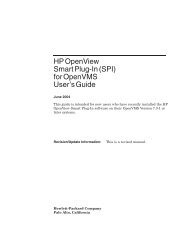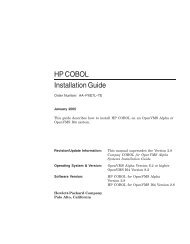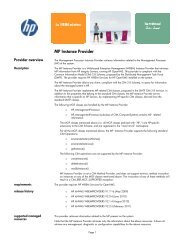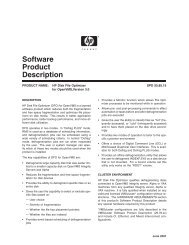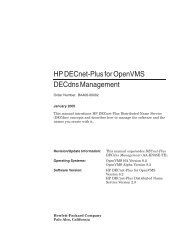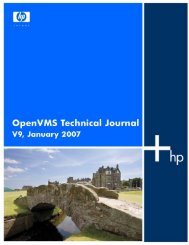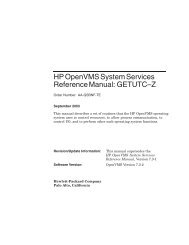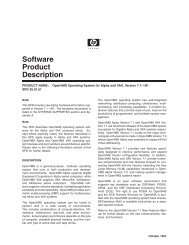HP Archive Backup System for OpenVMS Guide to Operations
HP Archive Backup System for OpenVMS Guide to Operations
HP Archive Backup System for OpenVMS Guide to Operations
Create successful ePaper yourself
Turn your PDF publications into a flip-book with our unique Google optimized e-Paper software.
4.9.2 Disabled<br />
4.9.3 OPCOM Class<br />
Media Management<br />
4.10 Pools<br />
A database server must have direct access <strong>to</strong> the database files located in<br />
MDMS$DATABASE_LOCATION. Direct access, access via MSCP, and access via Fibre Channel<br />
are all considered local access. Access via a network pro<strong>to</strong>col or DFS are not considered<br />
local access. It is recommended that you enable at least 3 nodes as potential database servers <strong>to</strong><br />
ensure failover capabilities.<br />
Set <strong>to</strong> disable the node as an MDMS node. Clear <strong>to</strong> enable the node as an MDMS node.<br />
You can specify the OPCOM classes <strong>to</strong> be used by MDMS <strong>for</strong> opera<strong>to</strong>r messages on this node.<br />
By default, the domain default OPCOM classes are used, but you can override this on a node-bynode<br />
basis. Specify one or more of the standard <strong>OpenVMS</strong> OPCOM classes - messages are<br />
directed <strong>to</strong> all login sessions with these OPCOM classes enabled.<br />
4.9.4 Transports and Full Names<br />
4.10Pools<br />
4.10.1 Authorized Users<br />
You can define which network transports are defined <strong>for</strong> this node. There are four choices:<br />
• DECnet - The DECnet transport is used<br />
• TCPIP - The TCP/IP transport is used, and the TCP/IP full name is specified<br />
• DECnet, TCPIP - The DECnet and TCP/IP transports can be used, with DECnet preferred<br />
• TCPIP, DECnet - The TCP/IP and DECnet transports can be used, with TCP/IP preferred<br />
If you identify TCP/IP as a supported transport, you must define the TCP/IP fullname in the<br />
TCP/IP fullname field. These fullnames are normally in the <strong>for</strong>mat “node.loc.org.ext”. For<br />
example, SLOPER.CXO.CPQCORP.COM<br />
If you identify DECnet as a transport, you need <strong>to</strong> specify a DECnet full name only if you are<br />
using DECnet-Plus (Phase V). In this case, enter the full name, which is normally in a <strong>for</strong>mat<br />
such as LOCAL:.node. If you are running DECnet Phase IV, do not specify a DECnet full name.<br />
The node’s node name is used.<br />
A pool is a logical MDMS object that associates a set of volumes with a set of users that are<br />
authorized <strong>to</strong> use those volumes. Every volume can be assigned one pool, <strong>for</strong> which we say that<br />
the volume is in the pool. The pool is then assigned a set of users that are authorized <strong>to</strong> use the<br />
volumes in the pool. If a volume does not have a pool specified, then it is said <strong>to</strong> belong <strong>to</strong> the<br />
“scratch pool” <strong>for</strong> which no authorization is required.<br />
Pools have three attributes that are discussed in the following sections.<br />
You can specify a list of authorized users <strong>for</strong> the pool, as a comma-separated list of users. Each<br />
user should be specified as node::username or group::username, where both the node/group and<br />
username portions can contain wildcard characters (*%). To authorize everyone, you can specify<br />
*::*. To authorize everyone on a node you can specify nodename::*. Everyone in the authorized<br />
user list is allowed <strong>to</strong> allocate volumes in the pool. Other users require MDMS_ALL_RIGHTS<br />
or MDMS_ALLOCATE_ALL rights.<br />
Media Management 4–17



